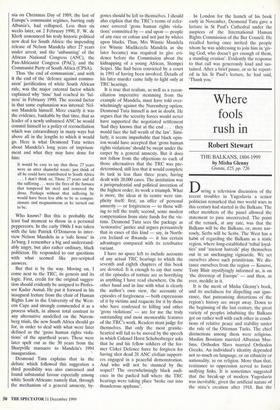Where fools rush in
Robert Stewart THE BALKANS, 1804-1999 by Misha Glenny Crania, £25, pp. 726 During a television discussion of the recent troubles in Yugoslavia a senior politician remarked that two world wars in this century had started in the Balkans. The other members of the panel allowed the statement to pass uncorrected. The point of the remark, at any rate, was that the Balkans will be the Balkans, or, more nar- rowly, Serbs will be Serbs. The West has a habit of regarding the Balkans as a static region, where long-established 'tribal loyal- ties' and 'ancient hatreds' play themselves out in an unchanging rigmarole. We set ourselves above such primitivism. We dis- tance ourselves from the region — Kosovo, Tony Blair mystifyingly informed us, is on 'the doorstep of Europe' — and then, as ever, meddle in it.
It is the merit of Misha Glenny's book, and its usefulness for dispelling our igno- rance, that patronising distortions of the region's history are swept away. Down to the beginning of the last century, the great variety of peoples inhabiting the Balkans got on rather well with each other in condi- tions of relative peace and stability under the rule of the Ottoman Turks. The chief distinctions among them were religious. Muslim Bosnians married Albanian Mus- lims, Orthodox Slays married Orthodox Greeks. An individual's identity depended not so much on language, or on ethnicity or nationality, as on religion. More than that, resistance to oppression served to foster unifying links. It is sometimes suggested that the break-up of modern Yugoslavia was inevitable, given the artificial nature of the state's creation after 1918. But the desire for enlarged political entities had roots in the early 19th century. Serbs and Croats joined together against the Hungar- ian yoke and promoted thb idea of a south- Slav, or yugoslav, nation, just as Greeks, spread throughout the region, dreamed of a much larger Greek state than the one that was forged in the revolution of the 1820s.
As the condition of the Turkish empire — the 'sick man of Europe' — deteriorated after 1815, a vacuum was created and the region became the site of competing ambitions. The history of the rivalries and conflicts which resulted is endlessly compli- cated and hard to follow. But a consistent line runs through them and it provides Mr Glenny with his major theme, that for 200 years the fate of the peoples living in the Balkans has been heavily influenced by the intervention of the Great Powers. Russia and Austria-Hungary hovered like vultures over the rotting Ottoman carcass. Seeking to block Russian and Habsburg aggrandise- ment, France and Great Britain were drawn into the great diplomatic game of the 'Eastern Question'. From the Crimean war onwards, when conflicts had to be resolved — in 1878 at Berlin, or as a result of the two crises in Bosnia-Herzogovina on the eve of the first world war — it was the European powers who framed the settle- ments. The one thing that every insurgent group in the Balkans learned was, as Glen- ny writes, that 'success was only guaranteed if a powerful foreign sponsor could be found'. The principalities of Moldavia and Wallachia, for example, 'sailed out of the [Ottoman] Empire's stagnant economic lake into the turbulent sea of great-power strategies and commercial interests', found a 'protector' in Russia and evolved into Romania. Russia was not, of course, inter- ested in the economic or social progress of Romanians. To prevent Romanian wheat exports from reaching Europe via the Black Sea and undercutting the price of its own wheat products overseas, Russia allowed the mouth of the Danube to become clogged with silt.
Of course, not everything depended on outsiders. Much of the conflict in the region stemmed from resentment at the power and wealth of the great landholders in what remained largely a feudal system and from the brutality, even after the aboli- tion of the janissaries, of local rulers who were beyond the restraining authority of the Porte. Ideas of nationalism and Enlightenment reform made their way from Germany and revolutionary France into parts of the Balkans, and they appealed to what Glenny calls the 'liberal bourgeoisie', although he does little to examine its size or importance.
Glenny observes in his introduction that most history of the Balkans has been writ- ten in monographs covering individual countries or isolated events. The chrono- logical structure of his own book, however, leaves little room for an analysis of over-
arching historical themes. Winkling them out for himself is made difficult for the reader by the narrative's toings and froings. After reaching the end of the revolutionary year of 1848-49, discussed from the point of view of Serbs and Croats, he finds him- self landed in 1820 and Romania. Roma- nia's story having been taken down to 1871, he is then returned to Bosnia in 1839. To present a unified history of so fragmented a region is a daunting task, If Mr Glenny has not entirely accomplished it, he has nevertheless provided us with a picture of the Balkans over the past two centuries that is at odds with popular conceptions. Developments were the unknowable out- comes of a mixture of dynamic contingen- cies, not the sterile rehearsal of eternal animosities. In the last decade we — for- merly the Great Powers, now blandly recast as the 'international community' — have looked down on the inhabitants of Yugoslavia, especially the Serbs, and talked of them as if they were unruly children and we the more civilised grown-ups. We have once again intervened, not evidently in pur- suit of national or strategic interests. Read- ing the modern history of the Balkans might help readers to answer the question whether we were wise to do so.



























































































 Previous page
Previous page